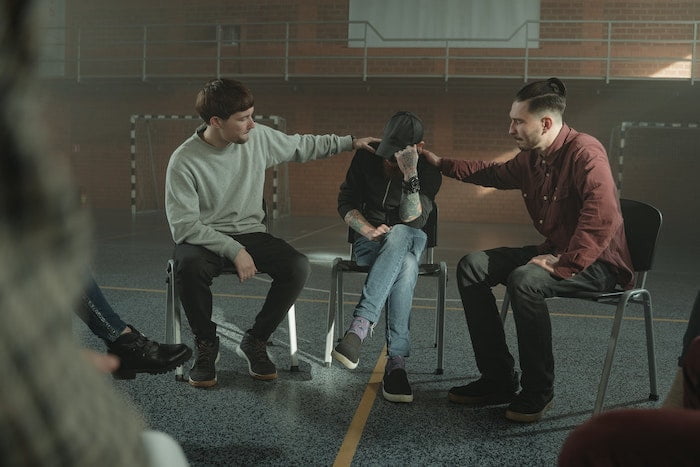Group Therapy
Quick links for Group Therapy for Addiction
- Why is group therapy for addiction needed?
- What happens during a group therapy session for addiction?
- Types of group therapy for addiction
- How are family members affected by addiction?
- Advantages of group therapy for addiction
- Disadvantages of group therapy for addiction
- References for group therapy for addiction
Group therapy is a form of addiction therapy in which a small number of people meet on a regular basis to discuss their experiences, thoughts, and problems with the support of one or more professionally trained therapists.
As an evidence-based and thoroughly researched form of addiction treatment, group therapy is one of the most important aspects of addiction recovery and is the most commonly used form of therapy for substance abuse. [1]
It allows patients to learn from each other’s experiences, with members providing support and encouragement while simultaneously gaining a deeper insight into their own behaviours and thought patterns regarding addiction.
Why is group therapy for addiction needed?

Two people discussing group therapy for addiction
Both individual and group therapy treatments are key to recovering from addiction, and it’s recommended that patients attend both group therapy sessions and individual sessions to maximise the chances of a successful recovery.
Group therapy offers a unique form of addiction treatment in which the individual is exposed to a range of different people, all of whom share similar experiences.
Each member of the group supports and is supported by the others, and this shared experience helps to combat isolation and loneliness.
This form of treatment is also good practice for the real world – many people struggling with addiction end up withdrawing from society, and the nature of group therapy allows them to practice their social skills with their peers in a safe and non-judgmental environment.
While individuals are encouraged to share their thoughts and feelings with other group members, they also have the opportunity to listen to other people.
This can help to develop feelings of empathy and compassion, and this unbiased look at someone else’s life can provide a deeper insight into their own behaviours and thought patterns.
What happens during a group therapy session for addiction?

Group therapy session for addiction in progress at a drug and alcohol rehab clinic
Many people are hesitant to try group therapy, but understanding what a typical group therapy session entails can help build confidence and alleviate many common fears.
Group therapy is usually led by 1 or 2 therapists who manage and treat a group of 6-12 people. The groups often follow a common theme, and most people in the group will be dealing with similar issues.
If you attend group therapy sessions as part of addiction treatment, most if not all of the other members of your group will also be struggling with addiction in some form. [2]
Sessions last between 1-2 hours and are usually held once a week, but can be more frequent if needed.
There are two types of therapy groups: open and closed.
Open groups are available to the public with new members potentially joining each week, leading to a more anonymous feel. Others are closed, with only a specific group of people invited to attend each session.
This can make the session feel more personal and private.
During a group therapy session, each member is able to share their personal experiences with addiction and the ways in which they are dealing with recovery and sobriety. It’s a chance to express your thoughts and feelings in front of a non-judgmental group of people, many of whom will be experiencing very similar things.

People at a group therapy session for addiction listening to a speaker
Group therapy works best when each person is open and honest. Often, therapists will seek to cultivate a sense of closeness by arranging trust exercises and other group work that can help foster a rapport between members.
This can help people to feel more comfortable when opening up about their addiction in front of the group.
You can choose not to participate in certain exercises if you wish, and can even just sit and listen for a few sessions if you don’t feel comfortable enough to speak up at first.
The therapist may also assign homework tasks to be completed between sessions, with the following session based on the results of these tasks.
There is no strict formula that a group therapy session will follow, and there can be key differences depending on the type of treatment that you choose to undertake.
Types of group therapy for addiction

Members holding hands during a session of group therapy for addiction
There are five main types of group therapy available for people dealing with addiction, and the treatment that you choose will depend on the specific issues that you are dealing with.
These include:
- Psychotherapy groups
- Cognitive therapy groups
- Dynamic group therapy
- Relapse prevention groups
- Mutual self-help groups
1. Psychotherapy groups
Psychotherapy groups focus on interpersonal relationships and communication skills, fostering a safe and supportive environment where members feel comfortable sharing their thoughts and experiences with the group.
2. Cognitive therapy groups
These groups adopt the methods and treatments used in cognitive behavioural therapy and apply them to a broader group.
The main focus is behavioural change, with patients working together to challenge their destructive behaviours and thought patterns and learn new skills that they can apply to real-life situations.

Person leading a session of group therapy for addiction
3. Dynamic group therapy
Group members will share many of the same experiences and struggles, and this form of therapy allows them to come together and discuss these issues in a supportive and non-judgemental environment.
4. Relapse prevention groups
This type of group is generally used after the individual has successfully completed an addiction recovery programme.
The first few months of recovery can be the most difficult and high-risk period – a relapse prevention group can allow them to identify any potential triggers and pave the way for long-term recovery from addiction.
5. Mutual self-help groups
This peer-led form of therapy is commonly seen in films and other types of media, with Alcoholics Anonymous being the most well-known.
Members meet regularly free of charge, with the goal of providing and receiving support around abstinence.
Advantages of group therapy for addiction

People gathering together in a hired space for a session of group therapy for addiction
As an extensively studied and thoroughly researched [3] form of treatment, group therapy can offer life-changing benefits to people struggling with addiction.
Below are just some of the advantages of group therapy:
1. Support network
When you regularly attend group therapy sessions, you are joining a support network of people who understand what you are going through.
They can help you on your journey to sobriety and encourage you to stop using addictive substances, and in turn, you can do the same for them.
2. New ideas
The diverse range of people that you will find at a group therapy session means that they can help you come up with solutions and new ideas that you may not have thought of yourself. Each person will have a unique way of looking at things – this can open your mind and show you that there is more than one way to view certain situations.
3. Sense of community
Hearing other people discuss their problems can put your own issues into perspective and help you to realise that you aren’t the only person struggling, which can foster a sense of community and belonging.
4. Inspiration
Seeing other people deal with their problems through group therapy can inspire you to deal with your own destructive behaviours and thought patterns.
When you surround yourself with people who are focused on self-improvement, it’s natural that you will want the same for yourself.

Therapist standing whilst leading a therapy group for addiction
5. Responsibility
It can be very grounding to have a specific day marked in your calendar every week.
The very nature of addiction is chaotic, so the fact that other people will be expecting you at each session will give your life more structure and responsibility. [4]
6. Reduces loneliness
The social nature of group therapy sessions can reduce feelings of loneliness that many people who are struggling with addiction find difficult to cope with.
If loneliness is a trigger for you, the support and companionship gained from this form of treatment can reduce the chances of relapse.
7. More affordable
If you are choosing to undergo private addiction treatment, group therapy may be a more affordable option than one-on-one sessions.
However, it is recommended that patients attend both group therapy sessions and individual sessions to maximise the chances of a successful recovery.
Disadvantages of group therapy for addiction

Peers comforting each other at a session of group therapy for addiction
Along with many advantages, group therapy also comes with a number of disadvantages that should be considered when selecting this form of treatment.
Below are some of the potential disadvantages of group therapy:
1. Less confidentiality
While a therapist would never reveal details of a patient’s treatment (except in extreme circumstances) the same cannot always be said for the other members of the group.
As this form of therapy involves a number of people who are not trained professionals, there is no guarantee of confidentiality.
2. Potential for dishonesty
As group therapy is based on a certain level of trust, it’s possible that some members may be dishonest about their progress.
This can have a negative impact on other members of the group, who may compare their own progress to this fictional account and feel disheartened.

Woman speaking with a therapist about group therapy for addiction
3. Less individual focus
Group therapy sessions naturally revolve around each member of the group, with each person taking turns to share their thoughts and experiences.
This means there is less focus on the individual, which can be difficult in certain situations including trauma and PTSD.
Some people may be more suited to one-on-one counselling, where the focus is entirely on them.
4. Difficult dynamic
While the dynamics in group therapy sessions are usually positive, it can become difficult if certain members of the group are dealing with mental health issues that could cause them to be disruptive. This can make other members feel uncomfortable and less able to speak up, and the more disruptive members may get more attention than quieter members.
The range of therapy treatments available today can be confusing and overwhelming, but the extensive amount of research and positive results around group therapy make it a promising option for anyone looking to recover from an addiction of any kind.
To learn everything you need to know about how group therapy could help you beat addiction once and for all, call our expert team on 0800 326 5559






